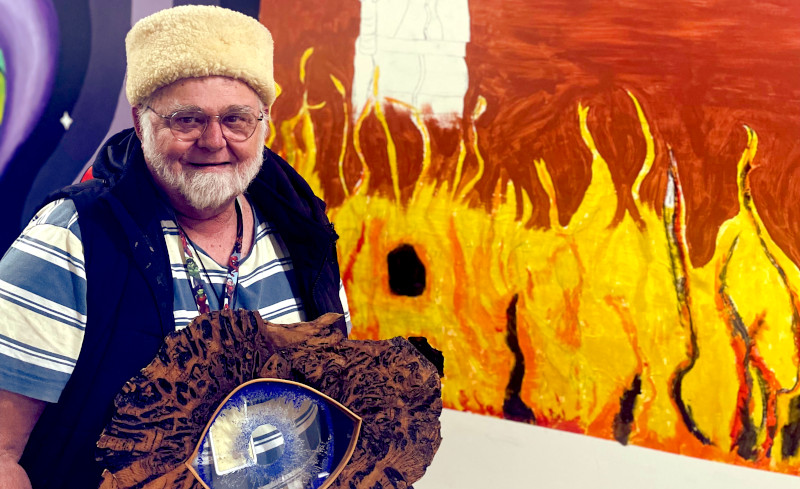Robert, aka ‘Poppy’, is a father, grandfather, friend, mentor – and someone with firsthand experience of homelessness.

A few years ago, he was addicted to poker machines. Working full-time as a hotel night manager, he found himself putting everything into the slots. Within hours of getting paid, the money was already in the machines.
“At the time I was a resident of Housing Commission housing in South Hobart and ended up falling about $10 000 behind in rent,” he said.
“I couldn’t deal with it and was hoping that I could win the money back.
“I wasn’t able to tell them (Housing) what was going on, I couldn’t communicate and I wasn’t able to tell them the truth. I was hoping to win the money to pay it back. I was eventually evicted and found myself on the streets.”
Robert continued working full time for eight months while living on the streets, sleeping near the Hobart Rivulet and on park benches or behind retail buildings during poor weather.
“I was trying to look normal. I was constantly hiding from everyone, scared of being attacked and recognised. I couldn’t look up and make eye contact with anyone,” he said.
The increasing temptation to take money from the work safe to put on the pokies eventually became too much.
“I rationalised that I would win the money back and replace it. That’s not borrowing, that’s stealing and the fact that I was thinking along those lines freaked me out,” Robert said.
“I saw the writing on the wall and the next day I resigned.
“I lasted about two weeks with what I had. I was devoid of any sense or logic – I couldn’t even think to go and apply for unemployment benefits. I had nothing.”
One night in town he begged Jesus “to come and save me” and a woman approached him and told him to go to Bethlehem House to find a bed that night.
“It took me about an hour and a half to get to Bethlehem House. My pride kicked in a few times and I nearly talked myself out of it,” he said.
“The real key was when I admitted to myself and to the people at Bethlehem House that ‘I have a real problem with the poker machines and I need help’.
“That was the switch, that was the change for me. Staff at Bethlehem House found me a bed that night. I slept, it was warm and they were monitoring me, so I knew they would be there to help.
“I was so unwell and in such bad shape that in my first days of being in Bethlehem House I had multiple teeth extracted and 16 fillings – I didn’t realise how much pain I had been putting up with.”
Robert stayed at Bethlehem House for 12 months and began the process of overcoming his addiction. He based his recovery on the 12-step program for Alcoholics Anonymous (AA).
“There was a counsellor at Bethlehem House who specialised in AA and recognised my addiction. I spoke to him once a week for an hour for six months, before continuing on my own,” he said.
After leaving Bethlehem House, Robert spent six months at a “halfway house” before being accepted into the Supported Accommodation Facility in Campbell St.
“I am really grateful to be here. It’s a safe space,” he said.
Initially he was hesitant to attend a Gamblers Anonymous meeting, but realised he couldn’t fully beat his addiction by himself.
Robert said being in recovery was difficult at first as he was still in denial and fearing that he might gamble again.
“I needed to hear from other people who have been in my shoes and share with them. I have been going ever since that first meeting about eight years ago, and as of July this year it is 11 years since I last gambled.”
“In the first two and half years of recovery I came into some money and made the decision to pay housing back my rental debt and other debts that I owed. I was really happy to have been able to do that.”
A watershed moment came about four years into his recovery, when he felt strong enough to ask why he was gambling in the first place.
He realised he had been financially irresponsible all his life and was “afraid” of money after growing up in a difficult family environment, with both parents addicts and fighting and arguing over money.
“In my mind I got the message that money equals violence,” he said.
“Subconsciously I was getting rid of money. I didn’t see it as a tool to manage life, but as soon as I recognised it was, I shared this with the other gamblers anonymous members and they understood what I meant and it felt good to share.
“I was finally truthful about my financial irresponsibility. And as soon as you recognise the truth, it flips the switch. Since then I have been able to save my money, and I purchased my own motorbike 10 months ago.”
He now runs online meetings for other gambling addicts three times a week and has shared his story in schools in the south of the state.
He has spent time in charge of the kitchen for Loui’s Van, a service he became involved with through his time at Bethlehem House, and has fond memories of the people who volunteered with him, especially a group of mothers who made soup for the van – affectionately known as the ‘souper-mums’.
Robert admits he is still working on his recovery, but says that “the most important part has been that my children trust me again”.
As for the future, Robert is looking forward to visiting his children and grandchildren for his upcoming birthday and hopefully finding the time to sit down and write a book.
Back to news and announcements
